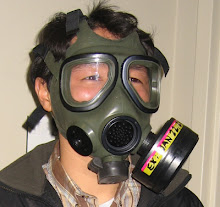#204: Media in Kyrgyzstan
Three weeks ago I went to a kurultay (convention), organized by the opposition to listen to what they have to say. I was not much impressed by the speeches, which were dull, and the uncharismatic opposition leaders, who seem to be still divided and lacking a common strategy against the government.
I found a seat in a corner far away from the stage, where there were a few empty seats. I have to admit there were a lot of people, although a few unoccupied seats remained. As I was listening to the speeches, a cameraman, whom I recognized as a cameraman from State TV, came to the corner and started filming the 10 or so empty seats. The next day I watched the State TV's weekend edition of Alatoo News, which they claim to be analytical and professional. I was not surprised when the State TV aired the footage from the kurultay, which showed empty seats and people who had dozed off, some of them with their tongues out. Then it showed me, walking with a friend out of the hall, while the commentator said that people were leaving because the kurultay was boring. I thought to myself that the State TV is going back to the Akaev-era one-sided coverage of the opposition.
The Freedom House released a report on Freedom of Press in 2008, which says:
Central and Eastern Europe/ Former Soviet Union: This region showed the largest region-wide setback, with Russia, Georgia, and Kyrgyzstan, and several Central European countries, among others, showing declines.The country report for Kyrgyzstan says:
Kyrgyzstan’s media environment continued to deteriorate in 2007 in the wake of a failure in 2006 to cement the brief gains seen after the fall of long-ruling President Askar Akayev the previous year. Attacks on journalists and crude government attempts to impose censorship were increasingly evident. Legal protections remained uneven, and with the country’s political elite polarized in an ongoing standoff between President Kurmanbek Bakiyev and the opposition, reforms stalled. Parliament debated legislation to decriminalize libel but failed to pass it into law. And while the long-awaited transformation of state television into public television took place, its supervisory board was plagued by conflicts amid signs that the president retained control over the state broadcaster.IWPR published an article about the law, passed by the Parliament, but waiting for President's signature. The law basically reverts all the attempt to transform the notorious State TV into a public broadcaster, which would now be under complete control of the President alone.
Media-watchers see the latest legislation as part of the downward trend, and note with concern that it was rushed through with minimum publicity.On the May 3 World Press Freedom Day, Azattyk Radio (Kyrgyz Service of RFE/RL) also seemed to be worried about the state of free media in Kyrgyzstan. The radio station organized an interview with an editor of a state-run newspaper and a journalists of a private newspaper.





No comments:
Post a Comment